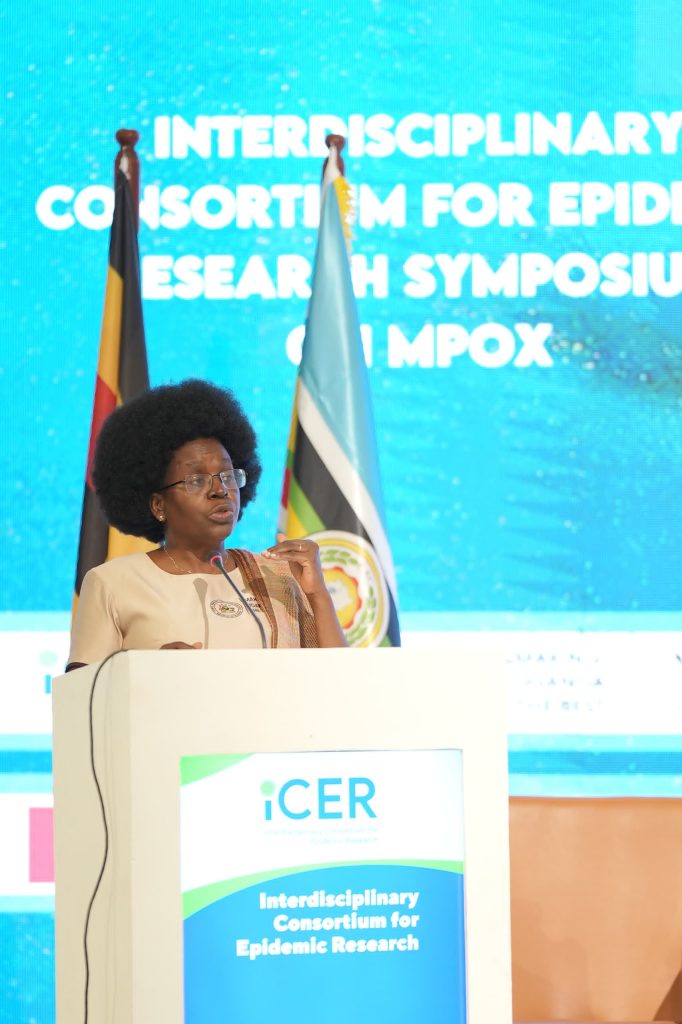The three-day Interdisciplinary Consortium for Epidemic Research (ICER) Symposium, hosted by the Makerere University Lung Institute, concluded on a strong note today, with key discussions centered on advancing epidemic research and fostering cross-border cooperation to combat public health challenges in East Africa. The event brought together scientists, policymakers, and health professionals, offering a platform for sharing cutting-edge research and devising practical solutions to health threats like mpox.
The symposium was graced by a high-level government delegation, including Rt Hon Robinah Nabbanja, Prime Minister of Uganda, and Hon Dr Monica Musenero, Minister of Science, Technology, and Innovation. Both officials reaffirmed Uganda’s commitment to epidemic preparedness, with a clear focus on self-reliance in public health interventions.
In her closing remarks, Prime Minister Nabbanja emphasized the importance of Africa taking full ownership of its public health challenges. Reflecting on the disruptions caused by the COVID-19 pandemic, Nabbanja noted that Africa’s vulnerabilities, particularly in supply chains and vaccine access, highlighted the urgent need for locally driven solutions. “We must move beyond the mentality of waiting for aid. Uganda, along with other African nations, must now take full responsibility for addressing our own health issues,” she said.

Nabbanjah praised Uganda’s effective management of recent health emergencies, including the mpox outbreak, which has seen coordinated efforts between the Ministry of Health and other critical sectors. “Uganda has proven capable of addressing its health challenges, and our response to mpox is a testament to this. However, we must continue investing in our local research and health systems to ensure sustainable solutions,” she added.
The Prime Minister also acknowledged the work of African scientists and called for greater investment in epidemic research, noting the long-term benefits for both public health and economic growth. “We cannot rely solely on imported solutions. Africa must develop its own vaccines, diagnostics, and health products to reduce reliance on foreign assistance and ensure the health security of its people,” she remarked.
Nabbanja further highlighted Uganda’s commitment to regional collaboration, urging East African nations to share data, research findings, and resources to strengthen epidemic preparedness. “Outbreaks anywhere are potential threats everywhere,” she said, quoting WHO’s Dr. Moeti and calling for a united effort across the region.
Hon. Dr. Monica Musenero, the Minister for Science, Technology, and Innovation, stressed in her speech the need for increased funding for epidemic research. She reflected on the lessons learned from the COVID-19 pandemic, during which many African countries were left unprepared for the rapid spread of the virus. “During COVID-19, we were unprepared, and many of our systems were overwhelmed. But that was also a turning point for us,” she noted.
Musenero praised Uganda’s progress in mobilizing resources and expertise to combat epidemics but warned of the gaps that remain, particularly in research funding. “We must close the gap between the outbreak of an epidemic and the funding of research. Often, by the time research receives the necessary funds, it is too late for the findings to have a meaningful impact on the current outbreak,” she said.
She also called on African nations to commercialize their research findings, turning them into products that can sustain future health interventions. “We sometimes shy away from the idea of commercializing our research, thinking it inappropriate to profit from health challenges. However, if we do not commercialize, we will remain dependent on external solutions,” Musenero stated.
The Minister lauded the formation of a consortium that brings together the Ministry of Health and the Ministry of Science, Technology, and Innovation with the aim of advancing research on epidemic prevention and response. She called on the Ugandan government and international partners to continue supporting these efforts.

Discussions throughout the symposium highlighted the far-reaching impact of public health issues such as mpox, not only on health systems but also on economic sectors like agriculture and trade. Rt Hon Justine Lumumba, who represented Prime Minister Nabbanja during the symposium, addressed the need for a multi-sectoral approach to tackling these challenges. She underscored the importance of engaging ministries beyond health, such as the Ministry of Agriculture, which has a direct stake in controlling diseases that affect agribusiness.
Lumumba noted that the involvement of decision-makers at all levels, particularly men who hold leadership roles in homes, businesses, and religious institutions, is crucial for the success of public health campaigns. “We need to ensure that the messages coming from this symposium reach the leaders who can influence change in our communities. We must educate them on the seriousness of these health challenges and ensure they take the necessary precautions,” she said.
Her remarks aligned with the broader theme of the symposium, which focused on tailoring public health messages to resonate with different segments of the population, particularly those most affected by health crises.
One of the key takeaways from the ICER Symposium was the need for sustained regional cooperation in epidemic preparedness. Policymakers from across East Africa were urged to continue sharing research findings and coordinating cross-border control measures to mitigate the spread of diseases.
The symposium also highlighted the critical role of interdisciplinary research in finding solutions to complex health issues. With participants from various fields, including epidemiology, virology, and public health policy, the event served as a hub for innovative thinking and collaboration.
As the symposium concluded, there was a collective commitment from all stakeholders to ensure that the insights and findings shared over the three days would be translated into actionable strategies. Uganda, as the host nation, reaffirmed its dedication to leading by example in epidemic research and preparedness, with the support of both local and international partners.
The ICER Symposium has not only brought to light the importance of epidemic research but has also solidified the need for a pan-African approach to health security, ensuring that Africa is better prepared for future health emergencies and MPOX for now.





